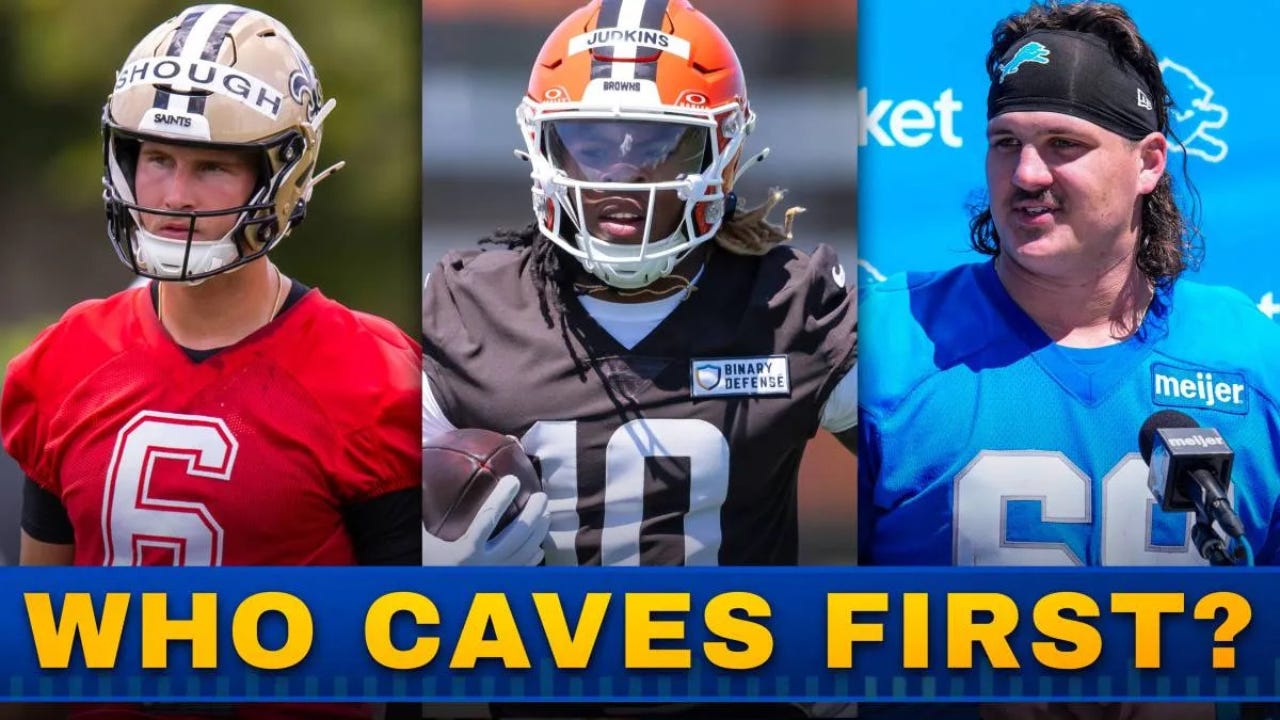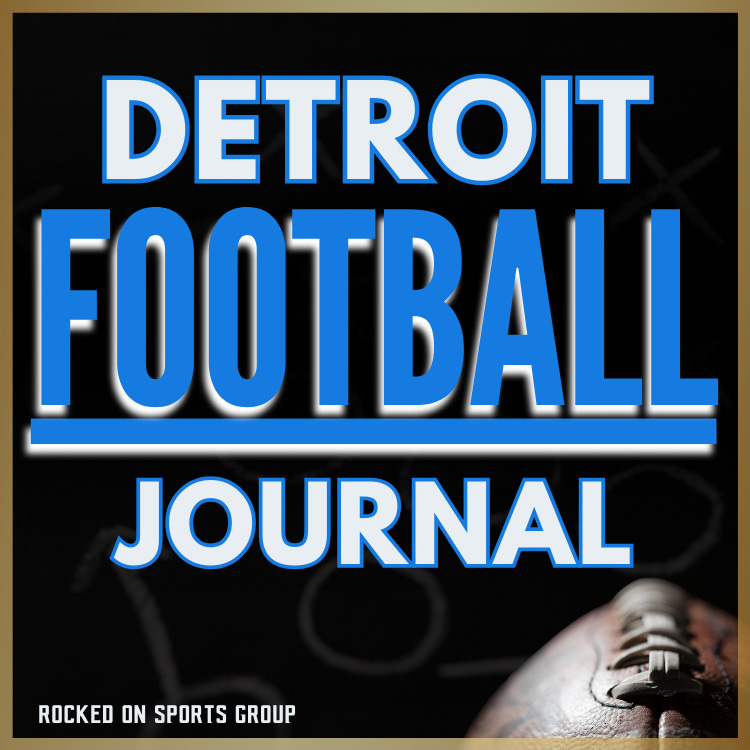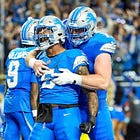The NFL Isn't BLINKING: Detroit Lions Rookie,Tate Ratledge Isn't Signing!
The complexities and negotiations that often accompany NFL contracts have been thrown out the window! Tate Ratledge’s Holdout Isn’t Just About Detroit—It’s About the NFL’s Future
Tate Ratledge’s Holdout Isn’t Just About Detroit—It’s About the NFL’s Future
As the Detroit Lions open training camp, second-round rookie Tate Ratledge remains unsigned. Expected to compete for the starting center role vacated by Frank Ragnow, Ratledge’s absence isn’t just a local concern—it’s part of a league-wide contract standoff that could reshape how rookie deals are structured for years to come.
The Precedent That Broke the System
Since 2011, the NFL’s rookie wage scale has assigned fixed salaries by draft slot, with full guarantees reserved for first-round picks. Second-rounders typically receive partial guarantees that decline with each pick.
That model cracked this year.
The Houston Texans signed WR Jayden Higgins (34th overall) to a fully guaranteed deal. The Browns followed with LB Carson Schwesinger (33rd overall). Now, 30 of 32 second-round picks remain unsigned—including Ratledge—as agents push for similar terms.
Why Ratledge Has Leverage
Ratledge isn’t just another unsigned rookie. With Ragnow retired and Detroit’s interior line in flux, he’s expected to start immediately. He even took reps at center during spring workouts, despite never playing the position at Georgia. Every day Ratledge misses is a day Jared Goff loses rhythm with his potential center. Detroit’s offense depends on continuity, with the first preseason game just 15 days away, the pressure is mounting.
“This isn’t just about Tate. It’s about the entire second round standing up and saying, ‘We’re not going to be discounted anymore.’ If the Lions cave, it changes everything. If they don’t, they risk their season unraveling before it starts,” said Will Rock on the Rocked On Detroit Lions morning show.
The Domino Effect
Detroit isn’t alone. The New Orleans Saints face a similar dilemma with QB Tyler Shough, their second-round pick who may start Week 1. If Shough lands a fully guaranteed deal, it could trigger a flood of concessions across the league.
The NFLPA has reportedly advised second-round picks to hold firm, waiting for Shough’s deal to set the next benchmark. Ratledge’s camp is watching closely.
What Happens Next?
There are three likely outcomes:
Detroit caves, offering Ratledge a fully guaranteed deal and setting a precedent.
Ratledge signs a traditional deal, weakening leverage for other unsigned rookies.
Another team blinks first, giving Detroit cover to hold the line.
“If Ratledge folds, it’s not just a loss for him—it’s a loss for every second-rounder trying to change the system. And if Detroit folds, they become the team that rewrote the rules,” Rock added.
What’s at Stake Financially?
Let’s break it down:
Average second-round rookie deal (2025): $9.45 million over four years
Retention rate: Only 60% of second-round picks remain on their original team after three years
Risk exposure: If a team guarantees the full $9.45M and the player busts, they could lose up to $3.78M per player.
Compare that to current norms, where only 50–70% of second-round deals are guaranteed. Under that model, teams can cut ties with minimal damage—often losing just $1.5–$2.5 million if a player underperforms.
The Escrow Rule: Why Guarantees Hurt More Than You Think
NFL teams must place guaranteed money into a segregated escrow account when signing contracts with guarantees beyond the first year. That means real cash—locked away and unusable for operations, free agency, or stadium upgrades.
For franchises with tighter liquidity, this isn’t just a cap issue—it’s a cash flow constraint. When the Browns signed Deshaun Watson to a $230M fully guaranteed deal, they had to escrow $170M upfront.
“If you’re asking owners to escrow millions for players who might not make it past Year 2, you’re not just changing contracts—you’re changing how teams build rosters,” Rock emphasized.
What Others Are Saying
“Giving a second-round pick a fully guaranteed deal is an outlier… Thirty rookies holding out feels a little like collusion.” — Curt Popejoy, USA Today Draft Wire
“Before 2025, no second-round picks had received fully guaranteed rookie contracts… Now 30 picks are holding out. Simple to explain, far from simple to solve.” — Mike Florio, Pro Football Talk
The Rules: “No Contract, No Camp”
While Articles 3, 7, and 23 of the NFLPA’s collective bargaining agreement focus on pay and per diems, league-wide precedent and team policy enforce one hard line:
Unsigned rookies cannot participate in any official preseason training camp activity. Without a signed Player Contract, no practices, meetings, or game-prep reps are allowed. Confirmed by multiple sources and reports, Tate Ratledge will not be able to participate in the Detroit Lions preseason training camp.
Download The Full NFLPA / CBA Here
Why This Matters for the League
Ratledge’s holdout is a referendum on second-round value. Many of these picks are expected to start immediately, yet their contracts don’t reflect that reality. The Higgins and Schwesinger deals exposed the gap between expectation and compensation.
If second-round guarantees become standard, teams may:
Draft more conservatively
Avoid high-risk positions like QB, WR, DE, and CB in Round 2
Push for CBA changes to eliminate the funding rule
Will Rock beleives the future for the NFL will be drastically changed in short order following the fall out from this holdout.
“You’re not just changing contracts—you’re changing how teams build rosters.”
Rock’s Take
Tate Ratledge’s holdout isn’t an isolated clash—it’s the opening drive of a deeper conflict between player leverage and owner control. As second-round picks demand financial respect, and teams grapple with risk and escrow realities, one truth emerges: the old contract playbook no longer works.
Whether Detroit bends or breaks, the result won’t just shape their season—it’ll help redraw the blueprint of rookie negotiations across the NFL. Because once you guarantee potential, you’re not just forecasting performance—you’re investing in change.
And the league? It’s officially on the clock.









Very Good Article!
That was a really good Article! I hope they figure this out ASAP!